A current i, indicated by the crosses in figure, is established in a strip of copper of height h and width w. A uniform field of magnetic induction B is applied at right angle to the strip.
(a) Calculate the drift velocity vd of the electrons.
(b) What are the magnitude and direction of the magnetic force F acting on the electrons?
(c) What should the magnitude and direction of a homogeneous electric field E be in order to counterbalance the effect of mangetic field?
(d) Calculate voltage V necessary between two sides of the conductor in order to creat this field E Between which sides of the conductor would this voltage have to be applied?
(e) If no electric field is applied from the outside, the electrons will be pushed somewhat to one side and therefore will give rise to a uniform electric field EH across the conductor until the forces of this electrostatic field EH balance the magnetic forces encountered in part (b). What will be the magnitude and direction of field EH?
Assume that n, the number of conductor electrons per unit volume is 1.1×1029m−3,h=0.02m,w=0.1cm,i=50A,andB=2T.
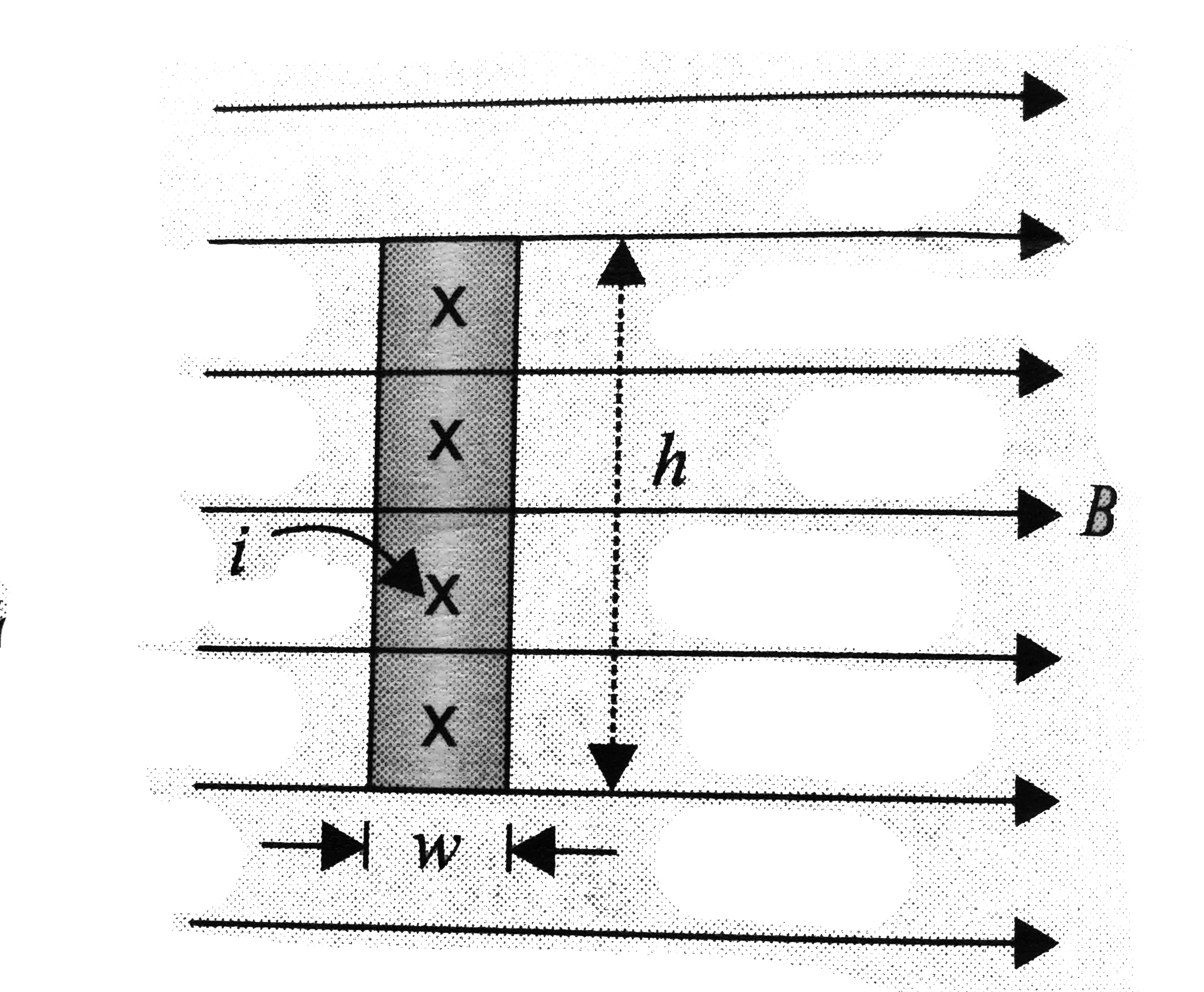
(a) The current density j is given by
j=iA=500.02×1.0×10−2=25×105Am−2
The drift velocity vd is given by
vd=jne=25×1051.1×1029×1.6×10−19=1.4×10−4ms−1
This velocity will be in outward direction.
(b) Magnetic force is given by F=evdB
=(1.6×10−19)(1.4×10−4)(2)
=4.5×10−23N (in downward direction)
(c) Force due to applied electric field should balance the magnetic force. For this we have Ee=F
or E=Fe=4.5×10−231.6×10−19=2.8×10−4Vm−1
(in downward direction)
(d) Necessary voltage to produce this field is
V=Eh=(2.8×10−4)(0.02)=5.6×10−6V.
This voltage should be applied between top and bottom
sides with top voltage positive and bottom negative.
(e) The magnitude of EH should be equal to E as calculated
in part (c). So, EH=2.8×10−4Vm−1 and this will be in
downward direction.
Topper's Solved these Questions
- MAGNETIC FIELD AND MAGNETIC FORCESBOOK - CENGAGE PHYSICSCHAPTER - MAGNETIC FIELD AND MAGNETIC FORCESEXERCISE - Exercise 1.1
22 Videos
- MAGNETIC FIELD AND MAGNETIC FORCESBOOK - CENGAGE PHYSICSCHAPTER - MAGNETIC FIELD AND MAGNETIC FORCESEXERCISE - Exercise 1.2
13 Videos
- MAGNETIC FIELD AND MAGNETIC FORCESBOOK - CENGAGE PHYSICSCHAPTER - MAGNETIC FIELD AND MAGNETIC FORCESEXERCISE - Multiple Correct Answer type
2 Videos
- KINETIC THEORYBOOK - CENGAGE PHYSICSCHAPTER - KINETIC THEORYEXERCISE - Question Bank
31 Videos
- Magnetism and MatterBOOK - CENGAGE PHYSICSCHAPTER - Magnetism and MatterEXERCISE - Question Bank
50 Videos
Similar Questions
A current I, indicated by the crosses in fig. is established in a strip of copper of height h and width w. A uniform field of magnetic induction B is applied at right angles to the strip.
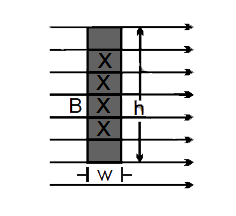
Calculate the drift speed vd for the electrons.
View SolutionA current I, indicated by the crosses in fig. is established in a strip of copper of height h and width w. A uniform field of magnetic induction B is applied at right angles to the strip.
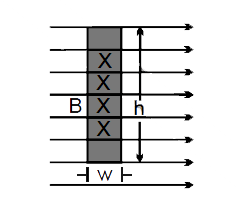
What are the magnitude and direction of the magnetic force F acting on the electrons?
View Solution
Knowledge Check
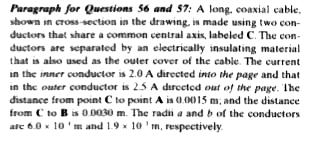
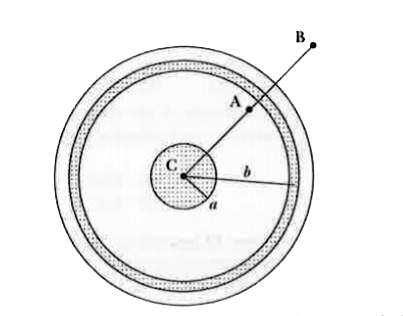 What is the magnitude and direction of the magnetic field at point B ?A3.3×10−5 T, clockwiseB6.8×10−5 T, counterclockwiseC3.3×10−5 T, counterclockwiseD2.7×10−4 T, clockwise
What is the magnitude and direction of the magnetic field at point B ?A3.3×10−5 T, clockwiseB6.8×10−5 T, counterclockwiseC3.3×10−5 T, counterclockwiseD2.7×10−4 T, clockwise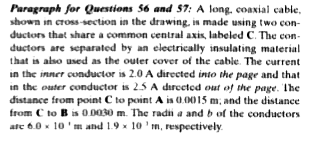
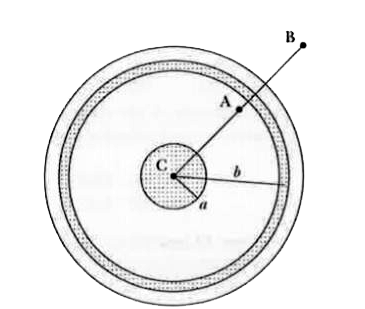
What is the magnitude and direction of the magnetic field at point A ?A3.3×10−5 T, clockwiseB6.8×10−5 T, counterclockwiseC3.3×10−5 T, counterclockwiseD2.7×10−4 T, clockwiseAn electron is travelling with velocity →v=3ˆi+5ˆjms−1 in a magnetic field tesla. What is the magnitude and direction of the force →F acting on the electron?
A18e N along +ve z- axisB18e N along -ve z- axisC36e N along -ve z- axisD54e N along +ve z- axis
A current I, indicated by the crosses in fig. is established in a strip of copper of height h and width w. A uniform field of magnetic induction B is applied at right angles to the strip.
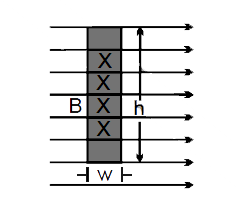
What would the magnitude & direction of homogeneous electric field E have to be in order to counter balance the effect of the magnetic field?
View SolutionA current I, indicated by the crosses in fig. is established in a strip of copper of height h and width w. A uniform field of magnetic induction B is applied at right angles to the strip.
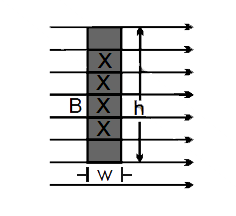
What is the voltage V necessary between two sides of the conductor in order to create this field E?
View SolutionA current I, indicated by the crosses in fig. is established in a strip of copper of height h and width w. A uniform field of magnetic induction B is applied at right angles to the strip.
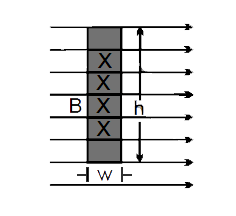
If no electric field is applied form the outside the electrons will be pushed somewhat to one side & thereforce will give rise to a uniform electric field EH across the conductor untill the force of this electrostatic field EH balance the magnetic forces encountered in part (b). What will be magnitude and direction of the field EH? Assume that n, the number of conduction electrons per unit volume, is 1.1×1029/m3 & that h=0.02 meter, w=0.1cm, i=50 amp, & B=2webers/meter2.
View SolutionWhat is the magnitude and direction of force on an electron moving along the direction of the magnetic field.
View SolutionA 15000V electron is describing a circle in a uniform field of magnetic indnction 250G acting at right angle to it. Calculate tbe radius oftbe circle.
View Solution